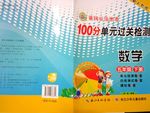题目内容
It was yesterday evening________ you had the electricity cut off in your house.
A.when B. that C. which D. in which
B
【解析】
试题分析:考查强调句。句意:你是在昨天晚上切断你家的电源的。把It was和空格去掉,组成的句子Yesterday evening you had the electricity cut off in your house.是完整的句子,因此为强调句,强调的是时间状语。用that。故选B。
考点:考查强调句。

练习册系列答案
 智慧课堂密卷100分单元过关检测系列答案
智慧课堂密卷100分单元过关检测系列答案
相关题目